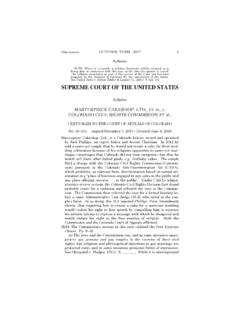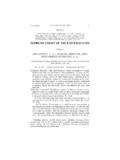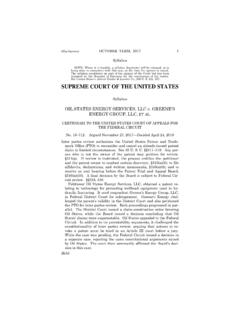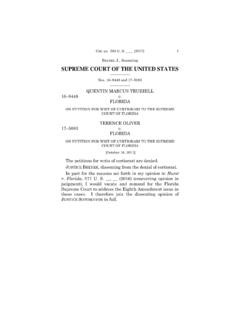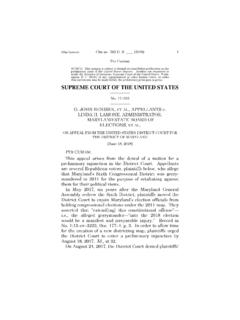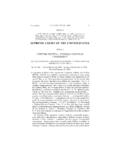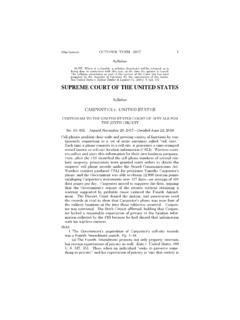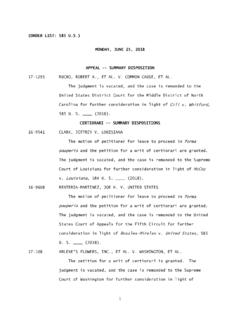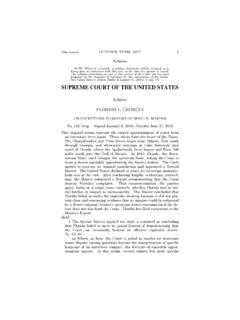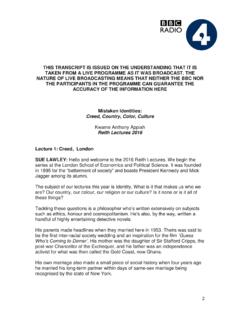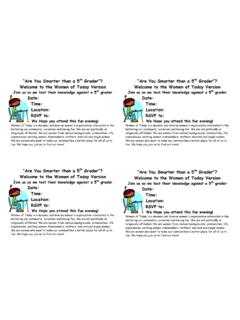Transcription of SUPREME COURT OF THE UNITED STATES
1 1 (Slip Opinion) OCTOBER TERM, 2017 Syllabus NOTE: Where it is feasible, a syllabus (headnote) will be released, as isbeing done in connection with this case, at the time the opinion is syllabus constitutes no part of the opinion of the COURT but has beenprepared by the Reporter of Decisions for the convenience of the reader. See UNITED STATES v. Detroit Timber & Lumber Co., 200 U. S. 321, 337. SUPREME COURT OF THE UNITED STATES Syllabus MASTERPIECE CAKESHOP, LTD., ET AL. v. COLORADO CIVIL RIGHTS COMMISSION ET AL. CERTIORARI TO THE COURT OF APPEALS OF COLORADO No. 16 111. Argued December 5, 2017 Decided June 4, 2018 Masterpiece Cakeshop, Ltd., is a Colorado bakery owned and operatedby Jack Phillips, an expert baker and devout Christian. In 2012 he told a same-sex couple that he would not create a cake for their wed-ding celebration because of his religious opposition to same-sex mar-riages marriages that Colorado did not then recognize but that hewould sell them other baked goods, , birthday cakes.
2 The couple filed a charge with the Colorado Civil Rights Commission (Commis-sion) pursuant to the Colorado Anti-Discrimination Act (CADA),which prohibits, as relevant here, discrimination based on sexual ori-entation in a place of business engaged in any sales to the public andany place offering services .. to the public. Under CADA s admin-istrative review system, the Colorado Civil Rights Division first found probable cause for a violation and referred the case to the Commis-sion. The Commission then referred the case for a formal hearing be-fore a state Administrative Law Judge (ALJ), who ruled in the cou-ple s favor. In so doing, the ALJ rejected Phillips First Amendmentclaims: that requiring him to create a cake for a same-sex wedding would violate his right to free speech by compelling him to exercise his artistic talents to express a message with which he disagreed and would violate his right to the free exercise of religion .
3 Both the Commission and the Colorado COURT of Appeals affirmed. Held: The Commission s actions in this case violated the Free Exercise Clause. Pp. 9 18.(a) The laws and the Constitution can, and in some instances must,protect gay persons and gay couples in the exercise of their civil rights, but religious and philosophical objections to gay marriage are protected views and in some instances protected forms of expression. See Obergefell v. Hodges, 576 U. S. ___, ___. While it is unexceptional 2 MASTERPIECE CAKESHOP, LTD. v. COLORADO CIVIL RIGHTS COMM N Syllabus that Colorado law can protect gay persons in acquiring products and services on the same terms and conditions as are offered to other members of the public, the law must be applied in a manner that is neutral toward religion . To Phillips, his claim that using his artisticskills to make an expressive statement, a wedding endorsement inhis own voice and of his own creation, has a significant First Amendment speech component and implicates his deep and sincerereligious beliefs.
4 His dilemma was understandable in 2012, which was before Colorado recognized the validity of gay marriages per-formed in the State and before this COURT issued UNITED STATES v. Windsor, 570 U. S. 744, or Obergefell. Given the State s position at the time, there is some force to Phillips argument that he was notunreasonable in deeming his decision lawful. State law at the time also afforded storekeepers some latitude to decline to create specificmessages they considered offensive. Indeed, while the instant en-forcement proceedings were pending, the State Civil Rights Divisionconcluded in at least three cases that a baker acted lawfully in declin-ing to create cakes with decorations that demeaned gay persons orgay marriages. Phillips too was entitled to a neutral and respectfulconsideration of his claims in all the circumstances of the case.
5 Pp. 9 12.(b) That consideration was compromised, however, by the Commis-sion s treatment of Phillips case, which showed elements of a clearand impermissible hostility toward the sincere religious beliefs moti-vating his objection. As the record shows, some of the commissioners at the Commission s formal, public hearings endorsed the view that religious beliefs cannot legitimately be carried into the public sphere or commercial domain, disparaged Phillips faith as despicable andcharacterized it as merely rhetorical, and compared his invocation of his sincerely held religious beliefs to defenses of slavery and the Hol-ocaust. No commissioners objected to the comments. Nor were they mentioned in the later state- COURT ruling or disavowed in the briefsfiled here. The comments thus cast doubt on the fairness and impar-tiality of the Commission s adjudication of Phillips case.
6 Another indication of hostility is the different treatment of Phillips case and the cases of other bakers with objections to anti-gay mes-sages who prevailed before the Commission. The Commission ruled against Phillips in part on the theory that any message on the re-quested wedding cake would be attributed to the customer, not to the baker. Yet the Division did not address this point in any of the casesinvolving requests for cakes depicting anti-gay marriage Division also considered that each bakery was willing to sell oth-er products to the prospective customers, but the Commission foundPhillips willingness to do the same irrelevant. The State COURT of 3 Cite as: 584 U. S. ____ (2018) Syllabus Appeals brief discussion of this disparity of treatment does not an-swer Phillips concern that the State s practice was to disfavor the re-ligious basis of his objection.
7 Pp. 12 16.(c) For these reasons, the Commission s treatment of Phillips caseviolated the State s duty under the First Amendment not to base laws or regulations on hostility to a religion or religious viewpoint. The government, consistent with the Constitution s guarantee of free ex-ercise, cannot impose regulations that are hostile to the religious be-liefs of affected citizens and cannot act in a manner that passes judgment upon or presupposes the illegitimacy of religious beliefsand practices. Church of Lukumi Babalu Aye, Inc. v. Hialeah, 508 U. S. 520. Factors relevant to the assessment of governmental neu-trality include the historical background of the decision under chal-lenge, the specific series of events leading to the enactment or officialpolicy in question, and the legislative or administrative history, in-cluding contemporaneous statements made by members of the deci-sionmaking body.
8 Id., at 540. In view of these factors, the record here demonstrates that the Commission s consideration of Phillips case was neither tolerant nor respectful of his religious beliefs. The Commission gave every appearance, id., at 545, of adjudicating hisreligious objection based on a negative normative evaluation of theparticular justification for his objection and the religious grounds forit, id., at 537, but government has no role in expressing or even sug-gesting whether the religious ground for Phillips conscience-basedobjection is legitimate or illegitimate. The inference here is thus that Phillips religious objection was not considered with the neutralityrequired by the Free Exercise Clause. The State s interest could have been weighed against Phillips sincere religious objections in a way consistent with the requisite religious neutrality that must be strictlyobserved.
9 But the official expressions of hostility to religion in someof the commissioners comments were inconsistent with that re-quirement, and the Commission s disparate consideration of Phillips case compared to the cases of the other bakers suggests the 16 18. 370 P. 3d 272, reversed. KENNEDY, J., delivered the opinion of the COURT , in which ROBERTS, C. J., and BREYER, ALITO, KAGAN, and GORSUCH, JJ., joined. KAGAN, J., filed a concurring opinion, in which BREYER, J., joined. GORSUCH, J., filed a concurring opinion, in which ALITO, J., joined. THOMAS, J., filed an opinion concurring in part and concurring in the judgment, in whichGORSUCH, J., joined. GINSBURG, J., filed a dissenting opinion, in which SOTOMAYOR, J., joined. _____ _____ 1 Cite as: 584 U. S. ____ (2018) Opinion of the COURT NOTICE: This opinion is subject to formal revision before publication in thepreliminary print of the UNITED STATES Reports.
10 Readers are requested tonotify the Reporter of Decisions, SUPREME COURT of the UNITED STATES , Wash-ington, D. C. 20543, of any typographical or other formal errors, in orderthat corrections may be made before the preliminary print goes to press. SUPREME COURT OF THE UNITED STATES No. 16 111 MASTERPIECE CAKESHOP, LTD., ET AL., PETITIONERS v. COLORADO CIVIL RIGHTS COMMISSION, ET AL. ON WRIT OF CERTIORARI TO THE COURT OF APPEALS OF COLORADO [June 4, 2018] JUSTICE KENNEDY delivered the opinion of the COURT . In 2012 a same-sex couple visited MasterpieceCakeshop, a bakery in Colorado, to make inquiries aboutordering a cake for their wedding reception. The shop sowner told the couple that he would not create a cake for their wedding because of his religious opposition to same-sex marriages marriages the State of Colorado itself did not recognize at that time.
